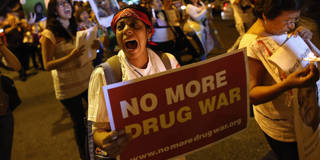For more than 50 years, the war on drugs has been a battle that only criminal organizations win. The only way out is with a new approach focused on saving lives, alleviating suffering, and maintaining human dignity.
BERLIN – On June 18, 1971, US President Richard Nixon launched the “war on drugs.” But, instead of improving public health and well-being in the United States by cracking down on drug use, he destroyed the lives of millions of people, both at home and abroad, especially in Latin America, Central Africa, and Southeast Asia. The question now is how to repair the damage.
Nixon’s approach to drug use was fundamentally punitive. It thus puts great pressure on law enforcement and the penal system, while sending millions to prison for non-violent offenses. In 2020, US law enforcement recorded more than 1.1 million drug arrests, the majority for simple possession. Non-white people have been disproportionately affected, despite having similar rates of drug use and sales as white people. Globally, around one in five people in prison are serving sentences principally tied to drug-related offences.
Moreover, the war on drugs has precluded effective regulation of drug production and distribution. This makes it easier for minors to access prohibited substances, and generates exorbitant profits for the criminal organizations that terrorize local communities. The war on drugs is a boon for corruption and a disaster for the rule of law.

BERLIN – On June 18, 1971, US President Richard Nixon launched the “war on drugs.” But, instead of improving public health and well-being in the United States by cracking down on drug use, he destroyed the lives of millions of people, both at home and abroad, especially in Latin America, Central Africa, and Southeast Asia. The question now is how to repair the damage.
Nixon’s approach to drug use was fundamentally punitive. It thus puts great pressure on law enforcement and the penal system, while sending millions to prison for non-violent offenses. In 2020, US law enforcement recorded more than 1.1 million drug arrests, the majority for simple possession. Non-white people have been disproportionately affected, despite having similar rates of drug use and sales as white people. Globally, around one in five people in prison are serving sentences principally tied to drug-related offences.
Moreover, the war on drugs has precluded effective regulation of drug production and distribution. This makes it easier for minors to access prohibited substances, and generates exorbitant profits for the criminal organizations that terrorize local communities. The war on drugs is a boon for corruption and a disaster for the rule of law.